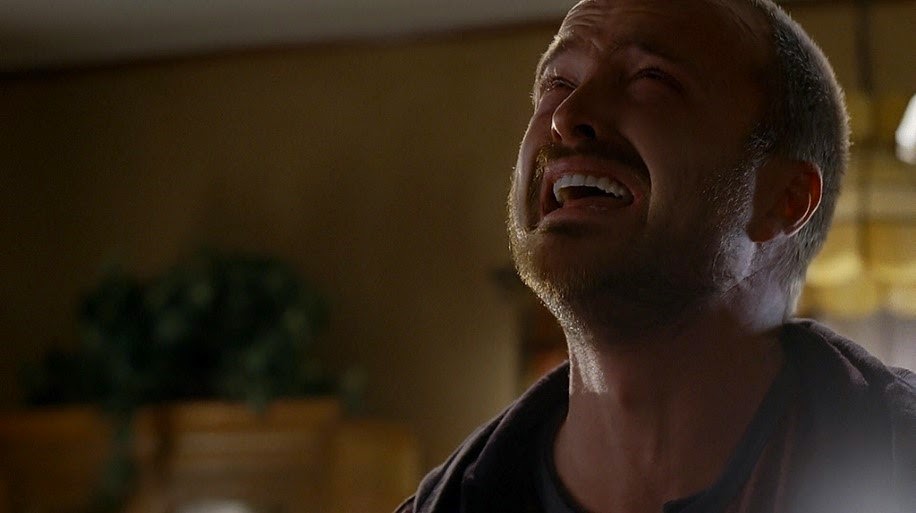Breaking
Bad: Death in Morality
Walter White, played by Brian Cranston, makes his
transformation from underachieving father into psychopathic moral monster.
White developed his evil alter ego, “Heisenberg,” to act as a portal into the
drug world he comes to enjoy so much. Whenever Walter dons his black hat, he is
no longer the man who loves his family, but the self-serving, maniacal murderer
the viewer comes to love. Walter is empowered through his journey by a
relativistic view of the world, “brought to life by his iconic representation
of Nietzsche’s ‘will to power.’”
Walter begins his moral decline from the very first episode;
he neglects to inform his DEA brother-in-law that he has witnessed a meth cook
fleeing the scene of a crime. He instead considers the money the meth business
provides and how it could change his life should he decide to participate.
Walter soon meets Jesse Pinkman, his former student, at his house in order to
offer a meth cooking relationship that we will witness for most of the show.
This relationship is the catalyst for Walt’s alter ego Heisenberg, and the
story juxtaposes these views. First, we can see how Walt’s relativistic moral
conscience twists reality in order for him to convince himself that the acts of
terror he commits are for the best. “The means justify the ends” is a phrase we
see Walt apply to his life in the fullest extent. The second side we can see is
that of the grief-stricken Jesse and the rollercoaster of emotions we watch him
endure. His distress shows the existential consequences that happens when man
violates the moral code of the world. “If Walter is an icon for the Nietzschean
world where God is dead, Jesse is a reflection of the inescapable human
condition wherein all men recognize God’s moral standards, whether they
attribute their origin to Him or not.”
We see the competing morals of Jesse and Walt played out
time and time again. Walter poisons children, bombs nursing homes, manipulates
his friends and family, and kills in order to further his self-interest. He becomes
so bent on protecting his life and reputation that he grows increasingly
distant to the atrocities he commits. We see Walt cry after having to kill a
man out of self-defense and struggle to cope with the realization. Fast-forward
a few seasons, and he has developed an elaborate ruse in order to make Jesse
turn on his employer. The plan? Walt poisons a child Jesse cares about and
blames the atrocity Gus Fring. We can see Walt descend from a man wanting to
provide for his family, to growing self-interest, to permeated greed, to a man
who is completely consumed with the desire for power.
At the start of Breaking
Bad, the viewer is made to immediate have sympathy for Walter, a
cancer-stricken husband and father with little money and a meek personality. However,
as Walt’s character and morals begin to deteriorate, we would expect for his
popularity to decrease. On the contrary, viewers became more enamored and
supportive of Walt as time passed. The show brings into question the morality
of the viewers themselves. How could people support such a corrupt individual?
Why do we continue to show affection for someone even after they are no longer
themselves? Even in the last few episodes, when Walt had totally lost himself,
I still found myself rooting for his cause. Maybe this is mankind’s way to
exercise the darker sides of human nature by living through another. We all
make decisions that make us drift towards either Walt or Jesse’s mindset. Whether
for selfish power or a search for a better self, no person’s pleas can sway us;
it is inevitably a choice we all must make alone.


“If Walter is an icon for the Nietzschean world where God is dead, Jesse is a reflection of the inescapable human condition wherein all men recognize God’s moral standards, whether they attribute their origin to Him or not.” - Who said this? Is that how you see Walter? Why? And why are moral standards inescapably God's? If Walter's broken bad, what's God got to do with it? (Not merely rhetorical questions for Nietzsche, Dostoevsky, and the speaker in this quote.)
ReplyDelete"no person’s pleas can sway us; it is inevitably a choice we all must make alone." This seems false. People are swayed by argument (reasoned or rhetorical) all the time. We must choose, true, but unless we strand ourselves on an island of existentialist solipsism there's no reason why we can't lean on friends and trusted advisors to help us make our choices. Responsibility for those choices is of course ultimately ours alone.